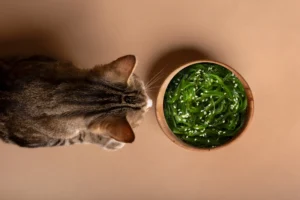Disclaimer: Always check with your vet on what “human foods” your cat can and cannot eat as information may vary based on their dietary needs and health conditions.
If you’re a cat owner, you’ve probably seen those “Prepare My Cat’s Meal With Me” type videos. A bowl of food in those videos typically showcases a mix and match diet of wet food, supplements, dried animal parts and toppers like raw quail egg. So can cats eat raw eggs? However, if raw eggs aren’t 100% safe for human consumption, how safe is it for our cats with even more sensitive stomachs to have it?
Read on to learn more about whether raw eggs is bad for cats or not, should they be eating it and alternative cat-safe options.
Table of Contents
Can cats eat raw eggs?
So are raw eggs safe for cats?
Raw egg isn’t completely safe for cats due to the risks of bacteria and nutrient imbalances. A safer alternative would be plain cooked eggs (scrambled or boiled) as they eliminate the risk of bacteria while providing the nutritional benefits.
However, if you still want to give your cat raw eggs, it’s important to be cautious:
- Consider using high-quality eggs from a trusted source
- Freeze them first to reduce bacterial risks
Raw quail eggs are often considered slightly safer than raw chicken eggs for cats as they may have less exposure to harmful bacteria due to their smaller size.
Are raw eggs bad for cats?
Raw egg isn’t necessarily bad for cats in small, occasional amounts, but it does come with risks that make it less than ideal as a regular part of their diet.
Here are the main concerns:
- Bacterial contamination: raw eggs can carry harmful bacteria like salmonella or E. coli, which can cause gastrointestinal issues, including vomiting, diarrhea, and dehydration.
- Avidin: this protein in raw egg whites can interfere with biotin (vitamin B7) absorption, potentially leading to skin and coat problems if fed in excess over time.
Which is why at Petchef, we ensure that all the ingredients that go into your cat’s meal is made for obligate carnivores! All the meals tailored for cats contain:
80% meat (chicken, buffalo, beef, salmon or tuna)
7% vegetables and 3% oils for additional beneficial nutrients
10% Moisture from nourishing broths
It’s completely free of preservatives, additives, fillers and grains! If you’d love for your cat to eat the food they were born to eat, come have a chat with our friendly pet nutritionist to find the ideal meal for your pet
For these reasons, while an occasional raw egg (like in a raw food diet) might not pose immediate harm, it’s safer to offer cooked eggs to your cat.
How much raw egg can cats eat?
If you decide to feed your cat raw egg, it’s important to do so in moderation to minimize the risks associated with bacteria and nutrient imbalances. Here’s a general guideline:
- Small cats: about 1/4 to 1/2 of a raw egg once a week as a treat or part of their raw diet.
- Larger cats: up to 1 whole raw egg, but again, it should not be a regular part of their diet.
Eggs, whether raw or cooked, should be offered only occasionally – once or twice a week at most – to avoid nutrient imbalances or digestive issues. If you’re feeding a raw diet, it’s essential to consult with a veterinarian or pet nutritionist to ensure everything your cat eats is properly balanced for their health!
How to tell when your cat had too much raw egg?
If a cat has had too much raw egg, there are a few signs you can watch out for, both short-term (immediate symptoms) and long-term (if raw eggs are fed too frequently):
Short-term Signs of Overconsumption
- Gastrointestinal issues: vomiting, diarrhea, lethargy, loss of appetite as raw eggs can carry bacteria like salmonella or E. coli.
- Digestive discomfort: some cats might show signs of an upset stomach after consuming raw eggs, like bloating or gas.
Long-term Signs of Overconsumption
Regular consumption of raw eggs in the long run could cause:
- Skin and coat problems: biotin deficiency would look like hair loss or thinning coat, dry or flaky skin and poor coat quality (dull, brittle fur)
- Nutritional imbalance: relying on raw eggs as a major food source can result in an unbalanced diet, leading to a variety of deficiencies or excesses, which could affect your cat’s overall health.
If your cat exhibits any digestive issues or skin problems, it’s a good idea to consult with your veterinarian. They can help determine whether the raw egg is the cause or if there’s another underlying issue.
How often can cats eat raw eggs?
Cats should only eat raw egg occasionally, and it should not be a regular part of their diet. Here’s a general guideline:
Small cats
1/4 to 1/2 of a raw egg once a week
Larger cats
1 raw egg once a week
If you’re feeding raw egg as part of a raw diet, be sure to check with your vet to make sure your cat’s overall diet is still complete and balanced.
Safer alternatives to raw eggs for cats
If you’re looking for safer alternatives to raw eggs that offer similar nutritional benefits for your cat, here are some good options:
Cooked eggs (best alternative)
Boiled, scrambled or poached without seasoning, butter or oil removes the risk of salmonella and avidin, which can block biotin absorption
Cooked meat (chicken, turkey, fish)
They’re also high in protein and essential amino acids Sardines: Rich in protein, omega-3 fatty acids, and essential vitamins
Bone broth
A great source of hydration, amino acids and minerals.
Conclusion about feeding raw eggs to a cat
While it’s not specifically bad for cats, the question of can cats eat raw eggs is worth considering. Raw eggs are not exactly the healthiest choice of food or even snacks for your feline friend. However, since eggs are considered superfoods for humans, you might wonder if they offer the same benefits to cats. The good news is that eggs can be a safe and nutritious treat—but preferably not in their raw form. If you’re asking, are raw eggs safe for cats, the answer is that they come with potential risks, such as bacteria and enzyme inhibitors that can interfere with digestion.
To keep your cat safe, always choose good-quality eggs and cook them before feeding. If raw feeding is your only option, refer to our guide above to determine how much you can safely offer based on your cat’s size.











